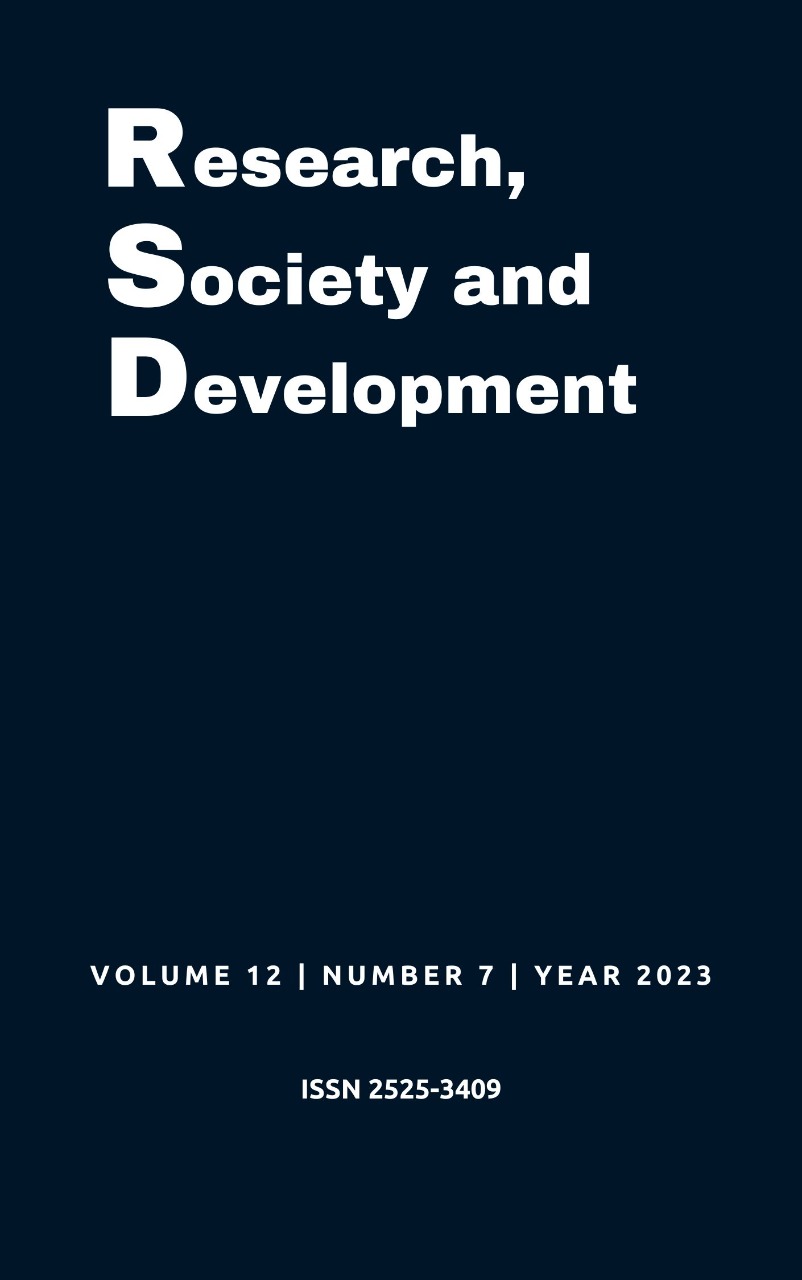Exploring the realm of bacteria: a practical approach during the Supervised Internship in Biological Sciences
DOI:
https://doi.org/10.33448/rsd-v12i7.42534Keywords:
Educational practice, Science education, Bacteria.Abstract
This article presents a series of classes taught by a research intern during her Supervised Internship of the Biological Sciences Course, addressing the topic of bacteria. The methodological approach of these writings approaches post-critical postures in education and configures an experience report. In the process of building the classes, several didactic resources were employed, such as concept maps and ludic activities, following the methodology of the Three Pedagogical Moments, in order to provide an alternative approach to scientific teaching throughout the classes. In addition, reflections and concerns arising during the teaching practice were recorded in written diaries, known as Pedagogical Practice Journal, serving as a tool for reflecting on and researching the actions taken and involving multiple authors in the process to compose and analyze teaching and its intersections. A remarkable engagement and enthusiasm from the students were observed in the differentiated classes, as well a certain discomfort with scientific terminology, highlighting the importance of science education connected to the students' reality, as well as paying attention to the particularities and individualities of the individuals present in the school environment.
References
Bauman, Z. (2008). Vida para consumo: A transformação das pessoas em mercadoria. Zahar.
Carneiro, A. J. de O. L. L., Souza, A. S. de, Rocha, R. da S., Silva Filho, J. G., Valle, P. R. D., Vieira, D. dos S., Matos, A. D., Silva, J. F., Pereira, A. L. & Silva, F. J. A. (2022). A importância das práticas pedagógicas no contexto escolar: dinamizando o ‘fazer pedagógico’ através da prática na Educação Básica. Research, Society and Development, 11(13), e87111334789. 10.33448/rsd-v11i13.34789. https://rsdjournal.org/index.php/rsd/article/view/34789.
Charréu, L. & Oliveira, M. O. (2015). Diários De aula e portfólios como instrumentos metodológicos da prática educativa em artes visuais. Cadernos de Pesquisa, 45 (156), 410-425. http://dx.doi.org/10.1590/198053142839
Chassot, A. et al. (1998). Ciência, ética e cultura na educação. UNISINOS.
Chassot, A. (2018). Alfabetização científica: questões e desafios para a educação (8a ed). Unijuí. 978-85-419-0253-3
Comenius, J. A. (2006). Didática Magna. (3a ed). Martins Fontes.
Corrêa, G. C. (2006). Educação comunicação anarquia: procedências da sociedade de controle no Brasil. CORTEZ.
Cunha, M. I. da. (2016). Inovações na educação superior: impactos na prática pedagógica e nos saberes da docência. Em Aberto, 29(97), 87-101. https://doi.org/10.24109/2176-6673.emaberto.29i97.%25p. http://rbep.inep.gov.br/ojs3/index.php/emaberto/article/view/3172.
Dalmaso, A. C. & Rigue, F. M. (2021). Emaranhados educacionais: a continuidade do viver e uma educação da atenção. Research, Society and Development, 10 (14), e117101421831. 10.33448/rsd-v10i14.21831. https://rsdjournal.org/index.php/rsd/article/view/21831.
Deleuze, G. & Guattari, F. (2012). Mil Platôs: capitalismo e esquizofrenia 2, 3. Editora 34.
Delizoicov, D. & Angotti, J. A. P. (1990). Metodologia do ensino de Ciências. Cortez.
Franco, M. A. do. R. S. (2016). Prática Pedagógica e docência: um olhar a partir da epistemologia do conceito. Revista Brasileira de Estudos Pedagógicos (on-line), 97 (247), 534-551.
Freire, P. (2022). Pedagogia da autonomia: saberes necessários à prática educativa (74a ed.). Paz e Terra. 9788577534098
Freire, P. (2022). Pedagogia do Oprimido (84a ed). Paz e Terra. 9788577534180
Ingold, T. (2015). Estar vivo: ensaios sobre movimento, conhecimento e descrição. Vozes. 9788532650528.
Ingold, T. (2020). Antropologia e/como educação. Vozes. 9788532664556
Jacinto Junior, S. G., Lucena, E. M. P., Alvezs D. R. & Morais, S. M. de (2021), O ensino de Ciências Naturais na educação básica por meio de atividades lúdicas: Uma revisão da literatura. Research, Society and Development, 10(6), e16110614643. http://dx.doi.org/10.33448/rsd-v10i6.14643. https://rsdjournal.org/index.php/rsd/article/view/14643.
Kraemmer, K. L. & Dalmaso, A. C. (2022). “Vamos sair da sala, professora?”: um ensaio sobre habitar o espaço escolar no retorno do ensino presencial. In: Rosalen, M. & Pauli, I (Orgs.). Movimentos Docentes: desafios do retorno presencial e renovações no cotidiano escolar. 198-211.
Larrosa, J. B. (2002). Notas sobre a experiência e o saber de experiência. Revista Brasileira de Educação, (19).
Maturana, H. (2001). Formação humana e capacitação. (2a ed.). Vozes. 85.326.2359-X.
Paraíso, M. A (2012). Metodologias de pesquisas pós-críticas em educação e currículo: trajetórias, pressupostos, procedimentos e estratégias analíticas. In: Meyer, D. E., Paraíso, M. A (Orgs). Metodologias de Pesquisas Pós-críticas em Educação. 23-46. Mazza Edições.
Rigue, F. M. (2020). Uma genealogia da formação inicial de professores de Química no Brasil (Tese de Doutorado). https://repositorio.ufsm.br/handle/1/21036.
Silva, I. A., Santos, C. B. dos, Silva, W. F., Silva, C. B., Silva, H. R. & Santos, D. S (2022). A importância de atividades práticas no ensino de ciências como estratégia no processo de aprendizagem. Research, Society and Development, 11(10), e342111032778. DOI: http://dx.doi.org/10.33448/rsd-v11i10.327782. https://rsdjournal.org/index.php/rsd/article/view/32778.
Downloads
Published
Issue
Section
License
Copyright (c) 2023 Kátia Luiza Kraemmer; Alice Copetti Dalmaso

This work is licensed under a Creative Commons Attribution 4.0 International License.
Authors who publish with this journal agree to the following terms:
1) Authors retain copyright and grant the journal right of first publication with the work simultaneously licensed under a Creative Commons Attribution License that allows others to share the work with an acknowledgement of the work's authorship and initial publication in this journal.
2) Authors are able to enter into separate, additional contractual arrangements for the non-exclusive distribution of the journal's published version of the work (e.g., post it to an institutional repository or publish it in a book), with an acknowledgement of its initial publication in this journal.
3) Authors are permitted and encouraged to post their work online (e.g., in institutional repositories or on their website) prior to and during the submission process, as it can lead to productive exchanges, as well as earlier and greater citation of published work.


